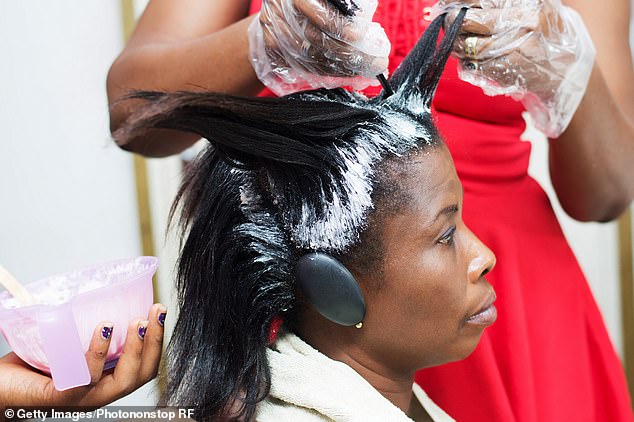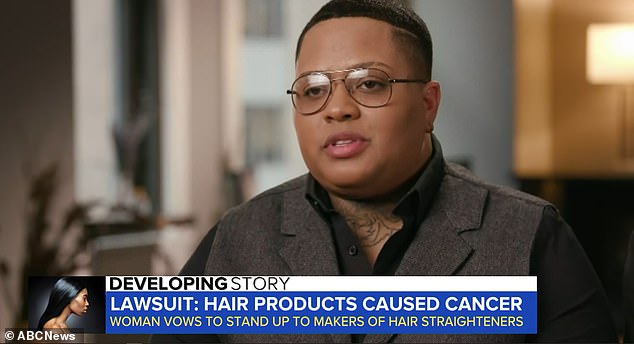FDA is mulling a ban on certain chemical HAIR STRAIGHTENERS which have been linked to womb and breast cancers
The Food and Drug Administration is considering banning chemical hair straighteners amid concerns the products cause cancer.
Marketed primarily to Black women, the products contain formaldehyde and other formaldehyde-releasing chemicals that scientists have long known to be linked to hormone-related cancers such as ovarian, breast and uterine cancer.
The proposed rule announced Friday will be followed by a public comment period, but a ban is not imminent. The FDA rulemaking process is typically a multi-year process.
Chemical hair straightening cream breaks protein bonds of curly hair and permanently straightens it with the help of formaldehyde, the chemical used to preserve cadavers to fix its effects.
Several women who have used these products throughout their lives have sued beauty giants like L’Oréal, claiming that devotion to their products led to their uterine and breast cancer diagnoses.

Chemical straighteners, typically marketed to black women, break protein bonds in curly hair using chemicals known to disrupt the body’s hormonal balance, leaving hair permanently straight

Jennifer Mitchell, 32, of Missouri, claims L’Oreal hair straighteners gave her uterine cancer. She had to undergo a total hysterectomy, where her uterus and cervix were removed, to prevent the disease from spreading to the rest of her body and depriving her of the ability to have children
The FDA proposed rule It does not specify which products may be affected. However, given that formaldehyde and formaldehyde-releasing ingredients such as methylene glycol are often used to fix the smoothing effect, the impact will be far-reaching.
The FDA has been aware of the risk of formaldehyde in chemical hair straighteners since at least 2016, when the popular Brazilian Blowout straightening treatment hit salons nationwide, but a ban never materialized.
The proposed rule follows October 2022 study from the National Institutes of Health, which found that women who used chemical hair straighteners that contained formaldehyde, parabens, bisphenol A or heavy metals had a nearly 150 percent higher risk of developing uterine cancer.
The study did not break down risk levels by race, but noted that adverse health effects may be greater in black women due to more frequent use.
Uterine cancer is rare, accounting for just over three percent of all cancers, but rates have increased among black women in recent years.
The FDA’s proposed rule found that the use of products containing FA and FA-releasing chemicals is associated with short-term adverse health effects, such as sensitization reactions and respiratory problems, as well as long-term adverse health effects, including an increased risk of certain cancers. ‘
About 81 percent of uterine cancer patients live at least five years after their diagnosis, but the rate drops to 63 percent for black women, which experts say is because they are more likely to be diagnosed with more aggressive types of tumors.
The FDA’s move was welcomed by Reps. Ayanna Pressley and Shontel Brown, both Black women from Massachusetts and Ohio, respectively, who in March replaced FDA Commissioner Dr. Robert Califf to conduct a thorough investigation into whether chemical hair straightening products currently on the shelves contain carcinogens that lead to a higher risk of uterine cancer.
Rep. Pressley said: “The FDA’s proposal to ban these harmful chemicals in hair straighteners and straighteners is a win for public health – especially the health of Black women…No matter how we wear our hair, we should be allowed to go hairless.” to appear in the world.” “Let’s endanger our health.”
Meanwhile, Rep Brown said, “On behalf of women, particularly Black women, across the country, I applaud the FDA’s new proposed rule banning formaldehyde and other harmful chemicals from hair straighteners.”
Millions of women born with coarse-textured hair are introduced to chemical relaxers and straighteners at a young age and use them throughout much of their lives.
Alabama native Rhonda Terrell was among several women who sued major beauty brands such as L’Oreal, Revlon, Strength of Nature and Soft Sheen Carson, which manufactured products that they said contributed to her aggressive uterine cancer diagnosis.
Ms Terrell started using chemical hair straighteners at the age of eight – and continued to use them until her late 40s.
After her initial diagnosis in 2019, she underwent six rounds of chemotherapy and was in remission for just over two years. But the cancer returned and spread to her liver and stomach.
And 32-year-old Jennifer Mitchell, who was the first to sue L’Oréal over claims that its products led to cancer and subsequent hysterectomy, had her hair straightened by the third grade.
At 28, she was diagnosed with uterine cancer and eventually had to undergo a total hysterectomy, which involved removing the uterus and cervix to get rid of the cancer.
L’Oréal said after the filing: “We are confident in the safety of our products and believe that the lawsuits recently filed against us have no legal basis.” “L’Oréal maintains the highest safety standards for all of its products.”
Ms Mitchell told Good Morning America: “Not being able to carry my own children was the hardest thing I’ve ever had to deal with.”
“This is a dream of mine that I have always wanted.”
Ms. Mitchell is also suing four other companies – Carson Inc in Georgia, Strength of Nature Global in Georgia, Dabur USA in New Jersey and Namaste Laboratories in Illinois.
Her lawyer says black women — who use the products more often — have long been “victims” of the companies’ marketing strategies.
This was revealed by a 2020 study conducted by researchers at Harvard University’s School of Public Health. They discovered harmful hormone-disrupting chemicals like parabens and phthalates in 50 percent of the products are marketed to Black women, compared to just 7 percent of products marketed to non-Black women.
